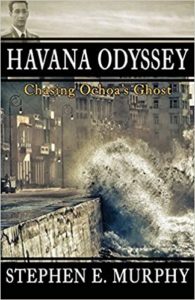Review — Havana Odyssey by Stephen E. Murphy (HQ Staff)
Havana Odyssey: Chasing Ochoa’s Ghost
by Stephen Murphy (HQ Staff 2002-03)
Self Published
296 pages
July 2020
$17.95 (Paperback), $8.49 (Kindle);
Reviewed by Sean Sullivan (Liberia 1970-72; staff 1970-76)
•
It took Odysseus 10 years of incredible adventures to make his way back to his home in Ithaca after winning the Trojan War, as the ancient Greek writer Homer relates. It took Stephen Murphy 10 days to return home after his epic journey in Cuba, as he recounts in his fascinating new book, Havana Odyssey: Chasing Ochoa’s Ghost. Both books, the former written 2500 years ago, the latter 25 days ago, mix fact with fiction and hold the reader spellbound.
Fact: Murphy had a brief affair in 1989 with Cuban dissident Ana Sanchez when they met while he was the U. S. Information Agency’s TV director in Washington DC. Ana was the niece of Arnaldo Ochoa, Cuba’s most decorated and famous general, noted for his leadership in exporting the Castro government’s revolution to South America and Africa. When the general returned from the wars, he was feted throughout Cuba and made Hero of the Republic, the nation’s highest honor, wherever he went, people would stand spontaneously to cheer him. Then, suddenly, he and three other popular generals were arrested and executed by firing squad. The charge was drug running and treason. The U. S. government had previously accused Raul Castro, Cuba’s Defense Minister and Fidel’s brother, of running drugs, so many within Cuba and without believed that the drug charge against Ochoa was to deflect attention away from Raul while simultaneously eliminating a potential rival for the island’s leadership. Others believed both men were drug runners. Whatever the truth, the execution of the general has remained very controversial inside and outside Cuba.
Murphy promised Ana that he would tell the general’s story to the world. Unfortunately, one day while he and Ana were out for a walk, Ana was kidnapped, presumably by agents of the Cuban government. She was returned to Cuba, and as a dissident and member of the Ochoa family, could not communicate with Murphy, or anyone outside of Cuba. Murphy never forgot his promise, but 31 years of life interceded, and it was only when another dissident told him that Ana was ill did he finally take action.
Fact and Fiction: Murphy did go to Cuba. Three times. And the “true-life” novel is a condensed account of his experiences during his trips to the island. The saddest experience for Murphy — who in the book goes by the name of Luke Shannon — was discovering that Ana had died just a few weeks before he arrived. The highlight of the novel was that Shannon, in Ochoa and Ana’s home town, discovering that he had a son, his “only begotten son” as he put it. Father and son discovered each other during an intense Santeria ceremony. Santeria is an Afro-Caribbean religion based on African Yoruba beliefs and traditions, with some Roman Catholic elements added, that is popular in Cuba, especially in the countryside. As Santeria believers danced and swayed under a giant tree, a fierce bolt of lightning struck the tree and suddenly, in this moment of illumination, Shannon and son recognized each other and hastily made a getaway together, becoming inseparable for the rest of the book. (I asked the author if he had really found his son, or was that part of the fiction. He declined to answer. You’ll have to decide for yourself.)
While father and son finding each other and eventually escaping the island together is the most exciting and powerful episode of the novel, Murphy’s on the ground reporting of what life is like for the Cuban people today is the sad subtext.
No one trusts anyone in today’s Cuba. When Murphy arrived in Cuba for the first time, he was interrogated by “the Inspector,” a government true-believer who hounded the author throughout his stays in the country. The Inspector reflected the Cuban reality that “Big Brother is watching.”
Telephones are tapped. Hotel clerks, tourist guides, taxi drivers, hangers-on, everyone is on the government’s payroll. Or snitches to curry favor with the government. As one sympathetic character says to Shannon, “everyone is seeking an advantage.” The average Cuban makes $1 a day if they are lucky. So seeking an advantage has become a way of life.
There are “good guys” though. One of the government’s intelligence officers, who had served with Ochoa, originally gave Shannon a hard time when he asked to see records related to the general’s trial. Later, he helped Shannon, and a friend, leave the island unscathed. Catholic priests and evangelicals associated with home churches (20,000 of them on the island) were especially helpful to Murphy/Shannon.
Murphy is an old hand in the Spanish speaking world. He speaks fluent Spanish and Portuguese and has lived and worked in Spanish speaking countries for decades. As director of World Wide Television, he worked with prominent Cuban exiles to bring Radio/TV Marti on air. He has held executive positions at the Inter-American Development Bank and the Peace Corps, among other organizations. His close ties to Cuba and the trust he has earned with Cubans inside and outside the island nation have provided him unvarnished insights into today’s poor, totalitarian Cuba. And enabled him to write this international thriller, which I highly recommend.
•
After a brief career as a journalist, Sean Sullivan ( PCV & Staff 1970-76) was with the Peace Corps in D,C. Liberia, Mauritius, Swaziland, Botswana, Lesotho. After the Peace Corps, he started a marketing communications agency in Stamford, CT. Later he and his partners started Advanced Drug Development Systems. His latest venture was Black-I Environmental.

Sean, so many hidden talents…. nice review.
Gracias, Sean, I’m glad you enjoyed Havana Odyssey. Castro permitting, let’s return to Old Havana and relive our odyssey through its winding streets and lively people, with a mojito at Paladar Mercaderes. Que tal?